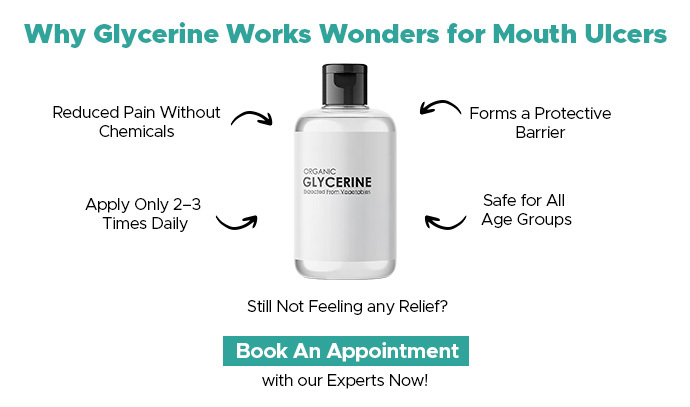
Glycerine: A Natural Remedy for Mouth Ulcers
Mouth ulcers can disrupt your day in an instant, making meals painful, conversations uncomfortable, and your overall oral health harder to manage. If you’re here, you’re already familiar with that sting. What you want is a practical solution that’s safe, fast-acting, and easy to find. Glycerine might just be the natural remedy for mouth ulcers that you’re looking for.
In this blog, we’ll break down how glycerine works for mouth ulcers, why it’s effective, and how to use it the right way, without overcomplicating things. Read on to explore simple, science-backed relief.

Why Glycerine Works for Mouth Ulcers?
Glycerine (or glycerol) is a naturally occurring, colorless, and odorless compound with humectant properties, which means it draws in and retains moisture. It’s commonly found in skincare products and oral hygiene solutions, but its real superpower lies in how it interacts with delicate tissues, like the soft lining of your mouth.
Here’s How Glycerine Helps with Mouth Ulcers!
- Hydrates the affected area: Keeps the ulcer moist, which prevents cracking or further irritation and allows tissues to regenerate more quickly.
- Forms a protective layer: Acts as a gentle coat over the ulcer, shielding it from spicy foods, acidic drinks, and bacterial exposure.
- Soothes pain and inflammation: Its cooling effect eases redness, swelling, and the raw, burning sensation.
- Encourages healing: By creating a moist, clean environment, glycerine reduces healing time without introducing chemicals that could irritate the sore.
Glycerine as a natural remedy for mouth ulcers, especially useful for those with recurring ulcers or sensitive mouths that react badly to synthetic treatments.
If you’re experiencing frequent, painful or unmanageable mouth sores, you can also seek guidance from a professional at our dental clinic in Calicut or dental clinic in Kannur for tailored advice.
How to Use Glycerine Effectively for Mouth Ulcers?
Using glycerine doesn’t require any complicated mixing or ingredients. With just a small amount and basic hygiene, you can incorporate it easily into your daily routine.
Step-By-Step Instructions to Use Glycerine Effectively for Mouth Ulcers:
- Rinse your mouth with clean water to remove food particles and bacteria.
- Dry the area gently if possible, using a tissue or by letting your mouth air-dry for a few seconds.
- Apply glycerine directly to the ulcer using a clean fingertip or a sterile cotton swab. Ensure it coats the sore fully.
- Do not rinse, eat, or drink for the next 20–30 minutes to allow maximum absorption.
- Repeat this process 2–3 times a day especially after meals and before bedtime.
Tip: Nighttime application works best since your mouth stays relatively undisturbed, giving glycerine more uninterrupted contact time with the ulcer.
Is Glycerine Safe for Everyone?
Yes; glycerine is generally safe for most people when used topically and in moderation. It is often used in oral care products and even food formulations. However, to ensure maximum safety and effectiveness, follow these usage guidelines:
Suitable for:
- Children: Safe under adult supervision, especially for minor mouth sores or irritation from braces.
- Adults and seniors: Ideal for recurring ulcers, dry mouth, or post-dental procedure care.
- Pregnant and breastfeeding women: Typically safe, but it’s always wise to consult a healthcare provider before starting any new remedy.
Important: Only use pharmaceutical-grade or food-grade glycerine. Avoid industrial or cosmetic glycerine as they may contain additives or chemicals not meant for oral use.
Why Choose Glycerine Over Other Remedies for Mouth Ulcers?
There are many options for treating ulcers, including gels, rinses and ointments. But, not all are gentle or effective for every case. Here’s why glycerine stands out:
| Remedy | Pros | Cons |
| Glycerine | Natural, gentle, safe for daily use | Needs consistent application |
| Antiseptic gels | Fast relief | Often contain alcohol or synthetic agents |
| Salt rinses | Easy to prepare | Can irritate sensitive tissues |
| Steroid ointments | Strong anti-inflammatory | Prescription only, not for mild cases |
If you’re looking for a reliable, chemical-free solution for mouth ulcers, glycerine offers the right balance between relief and safety.
Signs Your Mouth Ulcer Needs a Professional Attention!
While glycerine offers great relief, not every ulcer behaves the same. It’s important to recognize symptoms that suggest something more serious than a typical sore.
Pay attention if:
- The ulcer doesn’t heal after two weeks.
- It returns to the same spot frequently.
- It becomes unusually large, discolored, or starts to bleed.
- You’re facing increased discomfort with eating or talking.
These symptoms could indicate underlying health issues, ranging from nutritional deficiencies to immune responses. Knowing when to move from home care to expert advice ensures both comfort and safety.
Relief Can Be Simple! Book Your Appointment Now!
If you’re struggling with mouth ulcers, don’t ignore the pain. Relief is possible, and often without harsh chemicals. Glycerine as a natural remedy for mouth ulcers proves that healing doesn’t have to be complex or chemical-laden.
Still unsure or dealing with stubborn ulcers? Visit Elite Dental Studio, your trusted dental clinic in Calicut and dental clinic in Kannur for a professional evaluation and long-term relief.
Frequently Asked Questions:
Can I use glycerine for all types of mouth ulcers?
Ans. Yes, glycerine can be used for most minor mouth ulcers caused by irritation, nutritional deficiencies, or stress. However, if the ulcers are large, persistent, or recurring frequently, it’s best to consult a dental professional.
How often should I apply glycerine on a mouth ulcer?
Ans. For best results, apply glycerine 2 to 3 times a day. Let it stay on the ulcer for 20–30 minutes each time without rinsing, eating, or drinking during that period.
Is it safe to swallow glycerine after applying it?
Ans. While small amounts of pharmaceutical or food-grade glycerine are generally safe if accidentally swallowed, it’s best to avoid ingesting it in large quantities. Spit out any excess after application when possible.
How long does it take for glycerine to heal a mouth ulcer?
Ans. Healing time varies depending on the severity of the ulcer, but regular use of glycerine can help reduce pain and promote healing within 3 to 5 days for most mild to moderate sores.
Can children use glycerine for mouth ulcers?
Ans. Yes, children can use glycerine, but it should be applied under adult supervision. Always ensure you’re using food-grade or pharmaceutical-grade glycerine only.
What should I do if glycerine doesn’t improve the ulcer?
Ans. If you see no improvement after 7 days of regular application, or if symptoms worsen, it may be time to seek professional evaluation. Persistent ulcers may be linked to nutritional deficiencies, stress, or underlying health conditions.
Have Dental Problem : Call us
CALICUT: +91 9745 072 555,
KOCHI: +91 9567 124 888
KANNUR: +91 9645874777
or make an Appointment
Take a smiling selfie and we'll Simulate your new smile See What Invisalign treatment could do for you!




